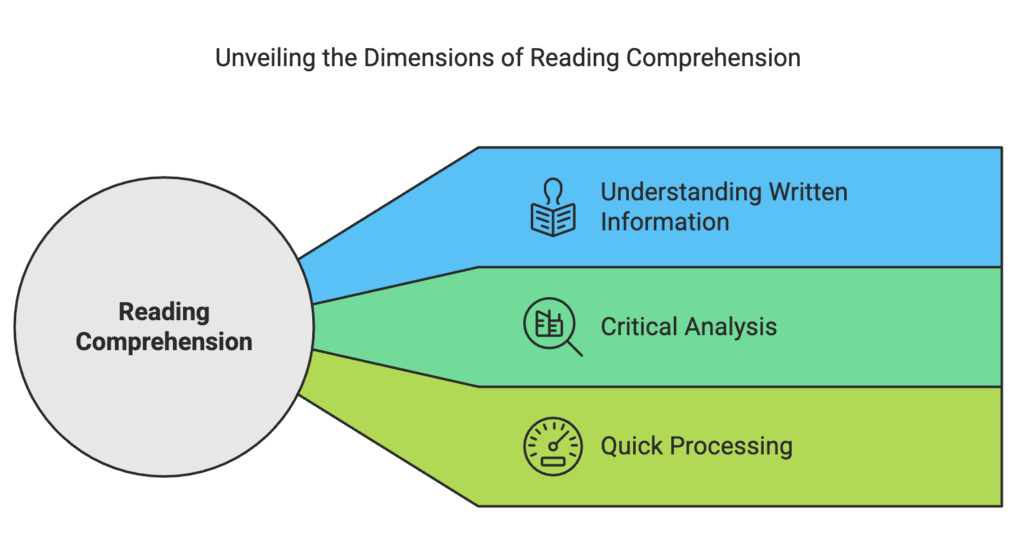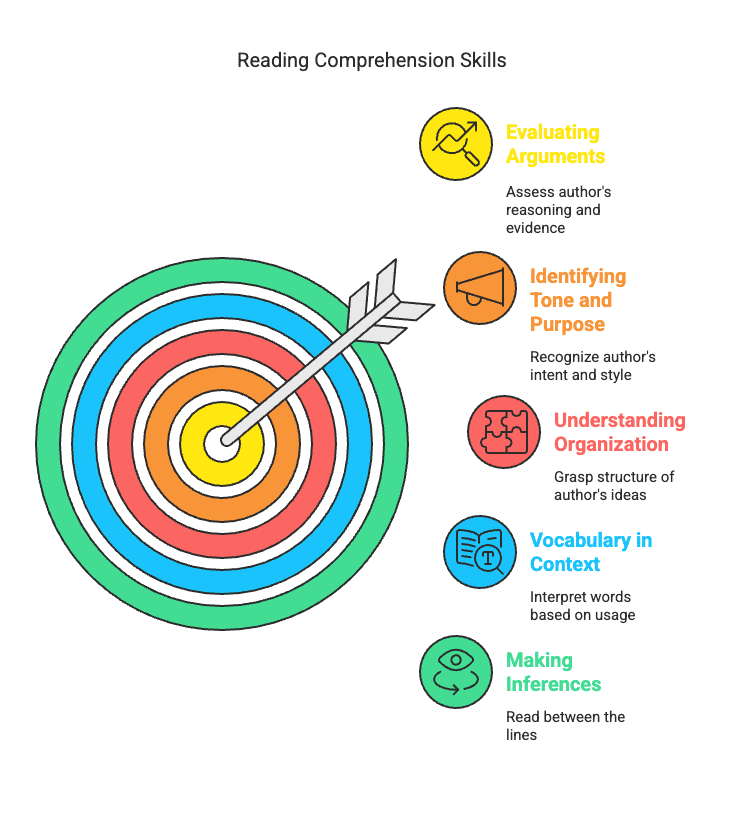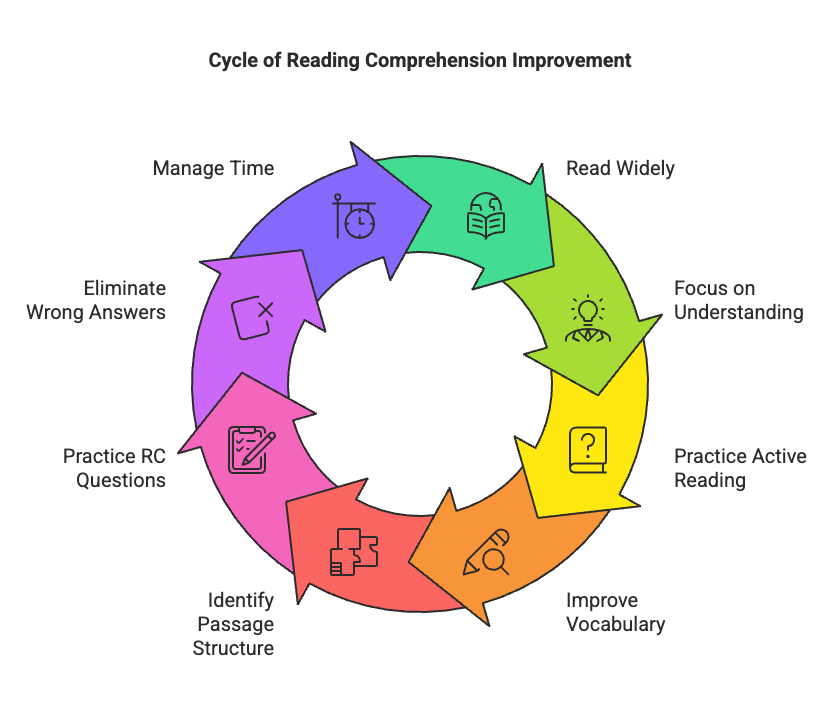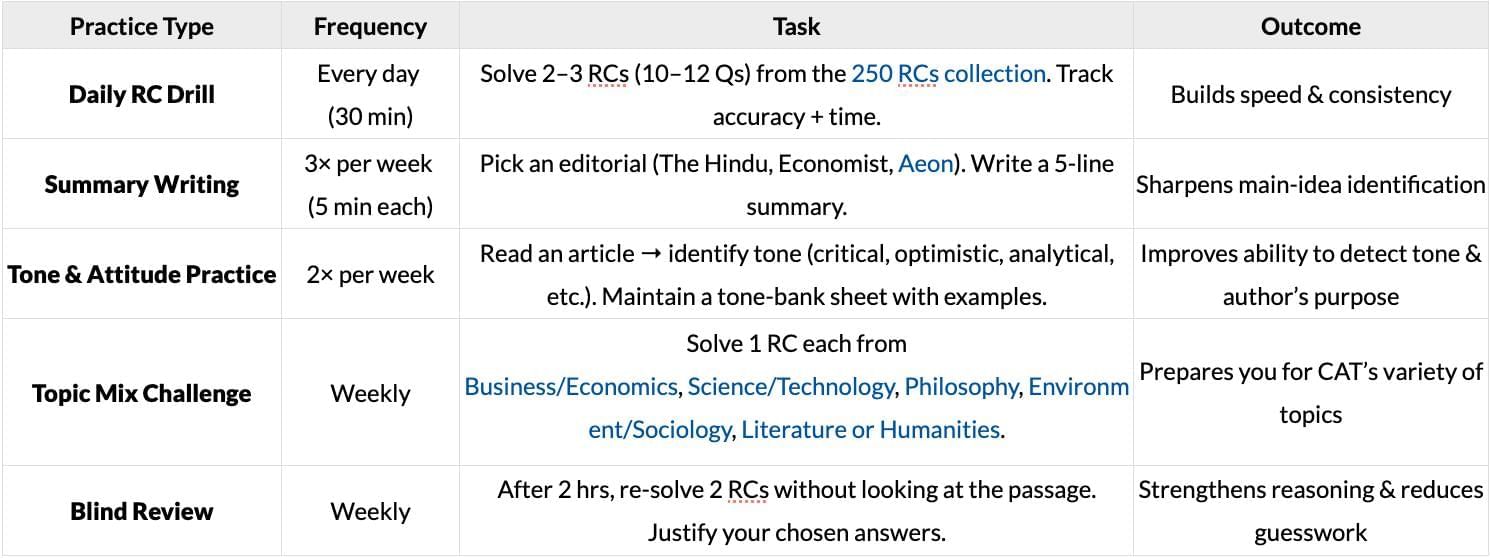The Importance of RCs in CAT Exam | 250 RCs for CAT Exam PDF Download
In CAT and other MBA exams, nearly 70% of VARC is Reading Comprehension (RC). Master RC, and you master VARC. It’s much more than just a few questions. RCs test how well you can understand and analyse written information, think critically, and process complex ideas quickly – all skills you need to be a successful business leader.

Why is Reading Comprehension Crucial in MBA Entrance Exams?
RCs are a major part of MBA entrance exams for good reasons. Exam creators use them to check if you have the skills needed for success in business studies and as a manager.
High Weightage: In CAT, 16–18 out of 24 VARC questions come from RCs (around 70%). Doing well in RC often decides your overall VARC percentile.
Business Readiness: MBA programs rely heavily on reading and analysing case studies, research papers, and reports. RC practice trains you to quickly grasp key arguments, structures, and details — just like in B-school.
Managerial Skills: RCs check your ability to think critically, evaluate arguments, and make sound judgments. These are the exact decision-making skills every good manager needs.
In short, RCs are a key way for MBA programs to find students who have the thinking skills to succeed in their challenging courses and in the business world.
What Skills Do RCs Really Test?
RCs are not just about reading - they’re a thinking test. They measure whether you can understand, analyse, and evaluate complex ideas the way a future manager would. Broadly, they test three key skill sets:
1. Comprehension Skills
- Grasping the Main Idea: Identify the central argument without getting lost in details.
- Spotting Supporting Evidence: Pick out facts, examples, and data that strengthen the author’s point.
- Vocabulary in Context: Decode unfamiliar words or phrases from how they’re used in the passage.
2. Critical Thinking & Analytical Skills
- Drawing Inferences: Read between the lines and understand what is implied, not just stated.
- Recognising Structure & Flow: Track whether the author is comparing, contrasting, presenting a problem–solution, or building a theory.
- Judging Tone & Purpose: Detect if the author is being persuasive, analytical, critical, or descriptive — and why.
3. Evaluation & Decision-Making Skills
- Evaluating Arguments: Test the strength of reasoning, spot assumptions, and check for logical flaws.
- Weighing Perspectives: Compare multiple viewpoints and decide which one is stronger.
- Making Judgments: Use the given information to reach balanced, evidence-based conclusions — just like a manager must.
In short, RCs are a mini case study in themselves — testing how well you can comprehend, think critically, and make smart judgments under time pressure.

Why RCs Matter Beyond the Exam
RC is not just for cracking CAT — it prepares you for the entire MBA journey.
GD–WAT–PI Success: Strong RC skills help you analyse arguments quickly, frame logical responses, and stand out in group discussions, written ability tests, and interviews.
B-School Readiness: MBA coursework is filled with long case studies, research papers, and industry reports. The ability to extract key insights fast gives you a clear edge.
Managerial Mindset: RC trains you in critical thinking, evidence-based judgment, and clear communication — the same skills top managers use daily.
Think of RC as your first step into B-school thinking: structured, analytical, and decision-oriented.
Strategies for Acing RC Questions
RC is a skill you can train systematically. Here’s a playbook that works best for CAT aspirants:
1. Read Smart Sources
- Focus on CAT-type material: The Hindu editorials, The Economist, Aeon Essays, Scientific American.
- These mirror the complexity, tone, and style of CAT passages.
2. Prioritise Understanding Over Speed
- Accuracy > Speed in the beginning.
- Once you’re consistently accurate, practice timed RCs to build pace.
3. Spot Passage Structures
- Most passages follow a pattern: Problem → Solution, Compare & Contrast, or Theory → Application.
- Identifying structure makes it easier to locate answers.
4. Train Critical Thinking
- Ask while reading: What is the author’s agenda? What assumptions are hidden? Is the reasoning sound?
- This habit directly helps with inference and argument-based questions.
5. Strengthen Contextual Vocabulary
- Focus on how words are used in the passage, not rote lists.
- Use sources like past CAT RCs and Word Power Made Easy to sharpen contextual understanding.
6. Master RC Question Types
- Fact-based: Scan the passage for evidence.
- Inference-based: Think beyond what is said.
- Tone & Title: Link to overall purpose.
- Practise each type separately before mixing them.
7. Eliminate Aggressively
- Wrong options are usually too extreme, out-of-scope, or contradictory.
- Narrow down to 2 choices, then pick the one closest to the passage.
8. Simulate Exam Conditions
- Take sectional tests with a 24-question VARC set under 40 minutes.
- Track accuracy and time for each passage to spot weak areas.
Consistency matters more than random reading. Treat RC practice as a daily drill, not an optional extra.
EduRev Tip: For a more detailed guide on how to tackle RC questions, click here.

Exercises: Build Mastery in RC

Conclusion: Embrace the RC Challenge
- RC is not just a section - it’s the gateway to the 99th percentile in VARC.
- With nearly 70% of VARC riding on RC, mastering it can transform your score.
- RC equips you with critical thinking, analytical reasoning, and decision-making - the exact toolkit for B-school success and leadership.
- Treat every RC like a mini case study.
- Read, analyse, evaluate - and make it a daily practice. Stay disciplined, stay consistent, and you’ll not just crack CAT RCs - you’ll prepare yourself for the challenges of B-school and the business world.
|
15 videos|246 docs|10 tests
|
FAQs on The Importance of RCs in CAT Exam - 250 RCs for CAT Exam
| 1. Why are reading comprehension sections important in MBA entrance exams like CAT? |  |
| 2. What specific skills do reading comprehension questions test? |  |
| 3. What strategies can be employed to improve performance in reading comprehension sections? |  |
| 4. How can one effectively handle difficult reading comprehension passages during the exam? |  |
| 5. What mindset should candidates adopt when preparing for the reading comprehension section of the CAT exam? |  |
















